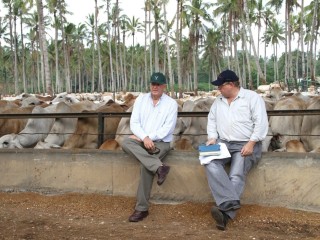 Consolidated Pastoral Company has posted a $19 million net loss after tax for 2010 on the back of cattle weight and import permit restrictions and more recent closure of the live export trade with Indonesia.
Consolidated Pastoral Company has posted a $19 million net loss after tax for 2010 on the back of cattle weight and import permit restrictions and more recent closure of the live export trade with Indonesia.
Chairman Ken Warriner said as a result of the recent ban of live cattle exports to Indonesia, CPC would cut its plans to invest further in northern Australia, instead looking at other opportunities including greater growing and finishing capacity in Queensland to spread risk.
Australia’s largest cattle exporter to Indonesia and second largest cattle producer overall, CPC’s beef herd grew to 357,000 head during 2010, spread across 18 properties. The former Packer family-controlled enterprise is now majority owned by London-based private equity firm Terra Firma.
CPC’s total asset value declined to $696 million in the 2010 calendar year compared with $703m a year earlier.
Mr Warriner said 2010 had been a year of challenges, particularly the unexpected restrictions by the Indonesian Government in May last year limiting import weights and restricting the issuance of import permits.
This resulted in the redirection of cattle which otherwise would have been exported to Indonesia to eastern and southern Australian meat processors. While this sudden, unexpected change affected the whole of the Northern Australian cattle industry, the impact on CPC’s own business was less than that felt in the general market due to the group’s supply agreements.
"But any change in policies of the Australian or Indonesian governments regarding the sale and transport of cattle can affect the sales and profitability of the company," Mr Warriner said.
The company continued to identify further acquisitions to increase geographic spread and operational flexibility, he said.
“The challenges relating to the Indonesian market have curtailed our desire to acquire land in areas overly dependent on that trade. Balancing the portfolio of properties with more finishing and backgrounding properties in Queensland is the more prudent strategy at this time.”
Property acquisitions made towards achieving that aim included Cooinda station, 24,000 hectares in central west Queensland, acquired in February 2010, followed by Gowan, 18,000ha near Blackall in Queensland’s southwest, settled in April 2011. Both properties added to CPC’s domestic finishing capacity.
Opportunities were also being investigated in alternate pastoral activities such as grain growing and sheep grazing, the annual report said.
“In the past, sheep grazing was a major component of CPC’s operations. The wool and sheep meat markets have improved considerably recently as a result of the sheep flock in Australia dropping from 170 million in 1990 to less than 70 million today,” Mr Warriner said.
“All markets and opportunities are being monitored, however appropriate opportunities are rare at this time due to the lack of sizeable properties coming on to the market meeting Terra Firma’s purchasing guidelines.”
Herd growth to 357,000 head during the year was due in part to earlier property acquisition, but also to a very good wet season in 2010, and the improved carrying capacity of properties, driven by development carried out under Terra Firma’s ownership.
Brandings in 2010 were disappointing, primarily due to a below average 2009 season hampering breeder conception for the following year. Calvings to date in 2011 were meeting expectations.
“The excellent 2010 season flowed-on to another good wet season in 2011 and augurs well for satisfactory brandings and turnoff in the current season,” Mr Warriner said.
The annual report said CPC and other stakeholders in Australia had done a considerable amount to address the welfare of cattle in both Australia and Indonesia, and the enforcement of recognisably acceptable standards of welfare would continue to be a company priority.
CPC and its business partner AGP had led the development of a humane and Halal-compliant killing process in Indonesia, with the introduction of stun-guns to be used in conjunction with restraining boxes. Stun-guns were currently being installed in all abattoirs where CPC cattle and other cattle from the company’s Indonesian joint venture feedlot were slaughtered. Specially-trained AGP personnel would be located in those abattoirs to monitor the practices being used.
Following the recent market suspension into Indonesia, Mr Warriner said other markets for live export were being actively investigated, including China, Russia, Turkey, Thailand, Korea, Malaysia and the Philippines.
“Limited numbers of cattle are currently being exported to these areas, however more work is required, particularly in the establishment of necessary protocols to enable the delivery of CPC cattle to these countries,” he said.
CPC’s sales values and margins were also negatively impacted last year by the A$’s 14pc appreciation against the US$ during 2010. Operating costs were adversely impacted by changes in export markets in the second half of 2010, resulting in incremental freight costs to relocate cattle from Northern properties to the south and east.
